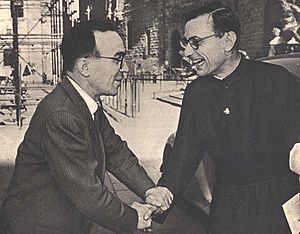Jean Daniélou facts for kids
Quick facts for kids His Eminence Jean Daniélou S.J. |
|
|---|---|
| Cardinal-Deacon of San Saba | |

Daniélou in Florence with the mayor, Giorgio La Pira (left) in 1953.
|
|
| Church | Catholic Church |
| Appointed | 30 April 1969 |
| Predecessor | Augustin Bea |
| Successor | Joseph Schröffer |
| Orders | |
| Ordination | 20 August 1938 |
| Consecration | 19 April 1969 by François Marty |
| Created Cardinal | 28 April 1969 |
| Personal details | |
| Birth name | Jean-Guenolé-Marie Daniélou |
| Born | 14 May 1905 Neuilly-sur-Seine, France |
| Died | 20 May 1974 (aged 69) Paris, France |
| Previous post | Titular Archbishop of Taormina (1969) |
| Motto | Fluvium aquæ vitæ ("The stream of the water of life") |
| Coat of arms |  |
Jean-Guenolé-Marie Daniélou (1905–1974) was a very important French Jesuit priest and a cardinal. He was known around the world as a theologian and historian. He studied the early Christian writers, called Church Fathers. He was also a member of the famous Académie Française.
Contents
Life and Work of Jean Daniélou
Early Life and Education
Jean-Guenolé-Marie Daniélou was born on May 14, 1905, in Neuilly-sur-Seine, France. His father, Charles Daniélou, was a politician who served in the French government. His mother, Madeleine Clamorgan, was a Catholic educator. She started schools for women. Jean's brother, Alain Daniélou, was also a famous historian.
Jean Daniélou studied at the Sorbonne in Paris. In 1927, he passed an important exam in grammar. In 1929, he joined the Society of Jesus, a religious order of priests and brothers. He taught at a boys' school in Poitiers from 1934 to 1936.
Later, he studied theology in Lyon. There, he met Henri de Lubac, who helped him focus on studying the Fathers of the Church. These were important Christian writers from early times. Jean Daniélou became a priest on August 19, 1938.
Serving as a Priest and Scholar
During World War II, Jean Daniélou served in the French Air Force. After France was taken over by Nazi Germany, he returned to civilian life. He then started his doctoral studies. In 1942, he finished his main paper on the spiritual ideas of Gregory of Nyssa.
He became a chaplain at a women's school in Sèvres. He spent most of his time researching early Christian writings. With Henri de Lubac, he helped start the "Sources Chrétiennes" book series. This series made ancient Christian texts available to more people.
In 1944, he became a professor at the Institut Catholique de Paris. He taught about the history of early Christianity. He later became a dean there. From the 1950s, he wrote several important history books. These included The Bible and the Liturgy and The Lord of History. His writings helped people understand how Christian beliefs developed over time.
Daniélou deeply understood the Fathers of the Church. He used their ideas to explain Christian faith. He focused on how God gives himself to us and how we respond to God's gift. He talked about how the idea of the Trinity (God as Father, Son, and Holy Spirit) became clearer through history.
Becoming a Cardinal
Pope John XXIII chose Daniélou to be an expert (`peritus`) for the Second Vatican Council. This was a very important meeting for the Catholic Church. In 1969, Pope Paul VI made him a cardinal.
To become a cardinal, he first became a bishop. He was assigned the title of Titular Archbishop of Taormina. Then, he was made a Cardinal-Deacon of San Saba in Rome. Jean Daniélou actually said no to becoming a cardinal twice. But Pope Paul VI insisted, and he finally accepted. On November 9, 1972, he was chosen to join the Académie Française. This is a very respected group that protects the French language.
Later Years and Legacy
Jean Daniélou passed away on May 20, 1974, in Paris. He was a highly respected scholar and religious leader. He is remembered for his deep understanding of early Christian history and his writings. His work helped many people learn about the roots of Christian faith.
See also
 In Spanish: Jean Daniélou para niños
In Spanish: Jean Daniélou para niños
 | James Van Der Zee |
 | Alma Thomas |
 | Ellis Wilson |
 | Margaret Taylor-Burroughs |

